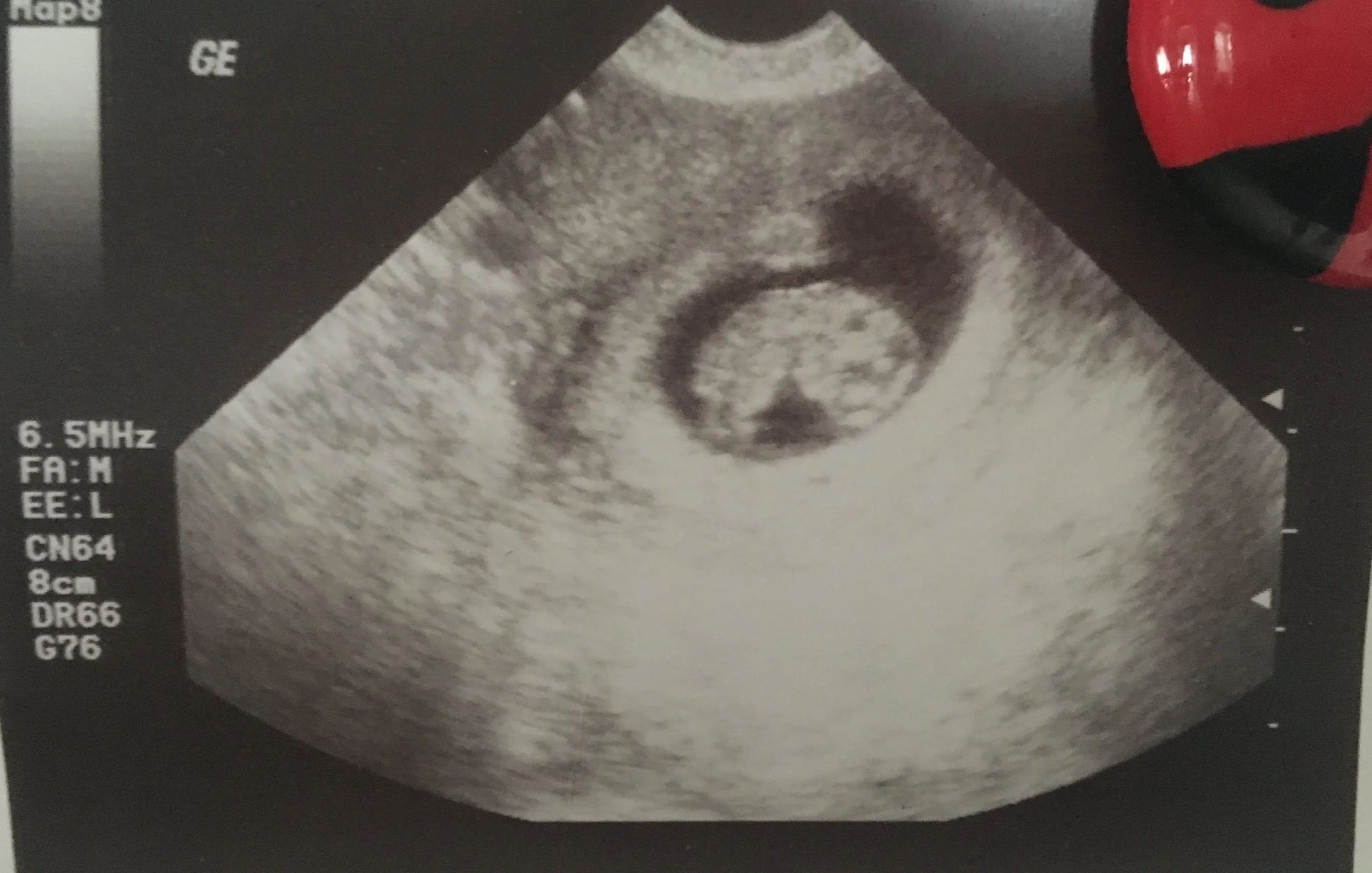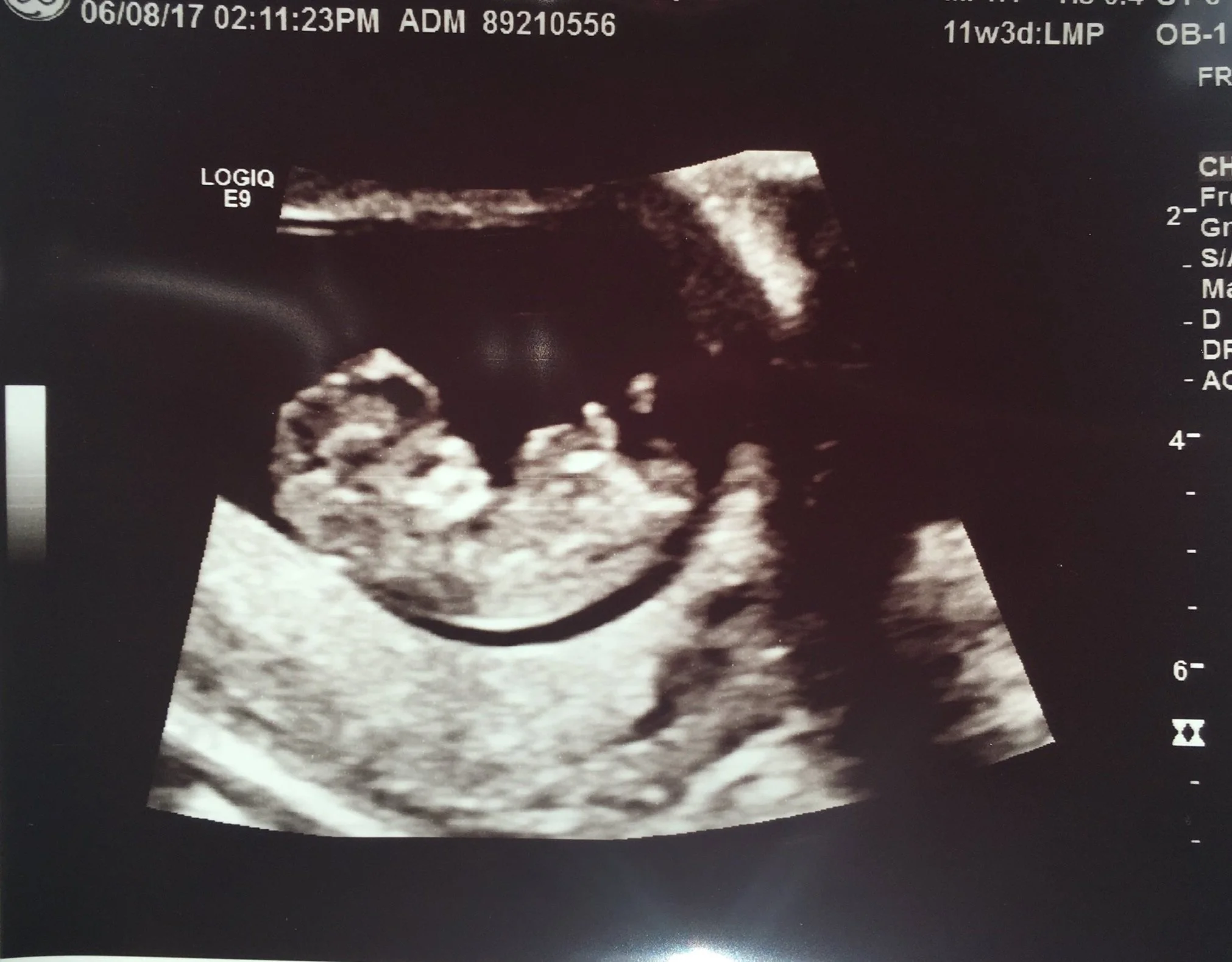Navigating the First Trimester of Pregnancy: Physical, Spiritual, and Emotional Changes
My positive pregnancy test for my first health pregnancy after two miscarriages. We bought this shirt with my previous pregnancy, which ended in miscarriage.
Ah, pregnancy, what a wonderful time of excitement and anticipation. Chances are this is your first or second baby, and you’re wondering what to expect in the first trimester. Maybe you’ve asked friends, and every answer is different. Or maybe, all you know is from the media and hearsay. Either way, wrapping your head around what’s to come can be very helpful for some mothers.
If you’re the type who likes to be prepared for all the possibilities, you’re in the right place. I’m going to try to give you a general overview of what is happening in the first trimester to your body and baby, and how this may affect you. I say maybe, because every woman will experience pregnancy differently.
I can say that all of my pregnancies have been different. Yes, there are similarities, but every pregnancy is just as unique as the baby it's growing. And since most women don’t see their healthcare team until later on, generally 8-12 weeks, most moms have to navigate the early weeks wondering what’s normal or not.
So, without further ado, let’s jump into what to expect in your first trimester, physically, emotionally, and yes, spiritually.
Physical changes of the first trimester
It’s safe to say that even with a peanut-sized baby, the changes of the first trimester are monumental for both mother and baby. The physical changes of pregnancy go far beyond just a growing belly. When my husband and I first started trying to conceive, my mom always told me how incredible a woman’s body is, but also how strange. Not only do your breasts change and your belly grows, but some women also experience nose reshaping, foot growth, and skin anomalies.
Some of these changes will go back to “pre-pregnant” states, but many will not. My feet grew larger and wider by half a size after my first pregnancy and have never gone back. Additionally, there are changes internally that are fascinating and show me time and time again how wise our Lord is to have created our bodies to grow a new life.
Beginning at conception, your physiology takes on a whole new function. As your baby grows cell by cell, your body rapidly changes to accommodate the new life. What you may not know is that it's your baby’s placenta that is influencing all the changes. Your body has to work overtime to support your baby because the placenta is not developed enough in the first trimester to sustain the baby’s life all on its own.
Let’s take a look at all the changes your body undergoes in the first trimester.
So happy to be bloated with a healthy baby. I was about 6 weeks pregnant here with our first healthy pregnancy.
Endocrine system (hormones):
hCG tells the corpus luteum (outer layer of the ovulated ovum) to produce progesterone and prevent further ovulation. The corpus luteum is responsible for progesterone and estrogen production until the placenta can take over by the end of the first trimester.
Thyroid hormone increases to accommodate brain growth and thyroid function in your baby.
The pituitary gland grows up to 135% during pregnancy to begin producing prolactin, which is required for breast tissue growth and breastfeeding.
Relaxin is produced first by the corpus luteum and then by the placenta to soften connective tissue and allow for abdominal growth, as well as opening the pelvis for birth.
Cardiovascular (heart):
From the beginning of pregnancy, progesterone plays a large role in increasing overall heart function. Not only does this increase the amount of blood that’s pumped through your body, but it also increases to support the placenta as well.
In the first trimester, it's not uncommon for mothers to experience low blood pressure under the influence of relaxin. Blood pressure reaches its lowest by 20-24 weeks. Hence why dizziness, lightheadedness, and fainting may be a normal symptom of pregnancy early on.
Renal (kidney):
The increase in blood volume causes the kidneys to grow and accommodate a greater filtration need.
This, along with the increase in aldosterone, works to increase the blood volume
Progesterone affects the function of the kidneys and causes the smooth muscle to relax, which can influence proper bladder emptying and may influence an increase in bacterial infections in more susceptible individuals.
Respiratory (breath):
With the rise of progesterone, the respiratory system experiences an increase in ventilation, which by itself could cause hyperventilation. But because of the accommodations of the renal system (kidneys), the blood/oxygen exchange is managed properly. (God’s design is perfect!)
Hematologic (blood):
The mother's blood volume has to increase by 1.5 liters throughout the pregnancy. This is for the baby, placenta, and eventual blood loss at birth.
An increase in red blood cells allows for optimal oxygen exchange for the mother and baby
The increase in blood volume creates a “physiological anemia,” so the threshold of anemia is lower for pregnant women.
Pregnancy causes an increase in clotting factors – this helps you not bleed out during birth.
Gastrointestinal (digestion):
Under the influence of relaxin, the digestive system tends to slow down. This can cause an increase in reflux and constipation, which can be managed with proper diet and hydration.
Integumentary (skin):
Estrogen and progesterone can increase the production of melanin – the pigmentation hormone – which can cause a darkened line across the abdomen (linea nigra), darkening areolas and nipples, hyperpigmentation in the face – melasma.
The changes of pregnancy are monumental, and when looked at without further discussion of function, it may seem overwhelming and worrisome. Anemia, low blood pressure, and relaxed kidneys all sound like a recipe for disaster. And outside pregnancy, it may be. But pregnancy isn’t a disease. We have a God who created us to work, and he knew that our bodies needed specific accommodations to grow a baby and thrive while doing it.
This doesn’t negate the struggle and potential symptoms you may experience, but it should shed light on just how much work your body is doing. And it’s because of these changes that you may experience some uncomfortable symptoms in your first trimester (or beyond).
6.5 weeks pregnant and we finally saw a healthy beating heart.
Just over 11 weeks, I was still so sick, but seeing her grow muted all the symptoms I had.
Common symptoms of the first trimester of pregnancy
It’s important to remember that even though all of our bodies will go through similar changes, we will all experience the changes differently. We all come to pregnancy with different backgrounds and health situations. Some of us are in the prime of our health and prepared extensively for pregnancy, while others are a bit surprised and are coming off a diet of Doritos and Diet Coke. This will influence how you handle the symptoms of pregnancy!
I also want to note that symptoms may come and go. If you experience nausea at week 5 and then nothing for 2 weeks, that isn’t always a bad thing. If you have horribly sore nipples one day and nothing the next, try not to worry. After 4 healthy pregnancies, I can confidently say that God gives us small breaks to give us strength for what is to come.
Common first-trimester symptoms include:
Aversions hungry, but nothing sounds good
Nausea
Exhaustion
Tender breasts/nipples
Cramping
Spotting
Gagging when brushing teeth
Fatigue
Light-headedness/dizziness
Fainting
Rather than seeing each symptom as a horrible change in your life, I’d challenge you to start seeing each symptom as a sign that you’re body is working to grow your sweet babe. Of course, it’s not comfortable, and it's perfectly appropriate to feel frustrated or exasperated at times, but try to remember that every wave of nausea or tender twinge of your breast has a reason.
When you start to cultivate a thankful mindset from the beginning of pregnancy, when labor comes, you have already trained your brain to welcome the sensations of contractions and opening. And more importantly, it helps you avoid the “victim” mindset that is so prevalent in our society and can rob you of the joy and sanctification of pregnancy.
How to ease annoying first-trimester symptoms
As I mentioned above, if you do experience symptoms in your first trimester, there is nothing wrong with taking action to try to ease them or lessen their hold on your life. You can be thankful for the growth of your baby and try to manage the nausea, fatigue, dizziness, etc.
Hydration
Hydration is vital as your blood volume increases. Part of the reason dizziness and lightheaded symptoms are common is because of the changes in her heart and lungs (as mentioned above). So, do your best to stay hydrated, drinking at least half your weight in ounces of water every day.
But keep in mind, it doesn’t do any good to drink water if it doesn’t make it into your cells. Simply sprinkling a few shakes of good salt (Redmonds Real Salt or Celtic Salt) into each glass of water can help your body hydrate at a cellular level.
Protein
The majority of us are grossly under-eating protein. Especially as Orthodox Christians, who fast almost half the year, you may find hitting your protein goals challenging. But once you’re pregnant, it's not just you that you have to worry about. Protein is necessary for building a healthy baby and sustaining your body at the same time.
Aim for getting in 30 grams of protein per meal. This may be challenging in the first trimester when nothing sounds good, but simple foods like bone broth, yogurt, or smoothies can pack a punch and aren’t hard to come by.
Better yet, combine protein, fat, and fiber every time you eat to keep your blood sugar balanced. This will go a long way in stabilizing nausea.
Lemon
I love adding lemon to my water, whether I’m pregnant or not, but there is something so refreshing about lemon when I’m nauseous. There are no potential side effects, and it may be what you need to stomach the bowl of yogurt you just got for yourself.
Ginger
Ginger is another gentle remedy that I wish more mamas utilized. I lived off of Ginger Chews in my first trimester with my oldest daughter. Even if the relief is slight, it still helped me so much and often helped me get passed the wave of bile that tried to come out.
Brush teeth (gently)
This is a tricky one for me because it worked in some pregnancies but not others. For my oldest two daughters, I had a horrible gag reflex and could hardly brush my teeth at all, let alone help with the nausea. But with my son, brushing my teeth was therapeutic and helped immensely.
Supplements
I always advocate for a whole foods approach, but there are some supplements that I readily take and recommend you look into.
Prenatal (not all created equal, I trust Seeking Health)
Magnesium glycinate
Digestion support
Desiccated liver
Fermented cod liver oil
Finally, if nausea or vomiting is so bad that you can’t keep water down and vomit multiple times a day, you may want to talk to your healthcare team about hyperemesis gravidarum (extreme pregnancy sickness). Often, pharmaceutical intervention is the only way to keep food down and lessen vomiting episodes.
What if you feel nothing in the first trimester?
Though it’s common to have pesky symptoms in the first trimester, many women have told me that they felt almost nothing during their first trimester. Apart from a missing period and slight fatigue, they went about their normal business and tried not to worry that something was wrong.
What’s interesting is that the mother who has no symptoms in the first trimester worries for her baby, while the mother with unrelenting nausea and fatigue prays for days of relief. The first trimester may be the first time that you experience “blind trust”. You can’t see what's happening inside, so you have to trust that everything is developing as it should.
If you don’t feel any symptoms, try to be patient and keep your feet planted firmly in prayer. 2 Timothy 1:7 states, “For God has not given us a spirit of fear, but of power and of love and of a sound mind.”
Spiritual changes of the first trimester
The first trimester is the first test of motherhood and trusting God’s will. You can’t feel any movement, you may or may not be sick, you may or may not be exhausted. You have to lean into trusting that God made your body to work perfectly. This will lend itself to the end of pregnancy when you have no choice but to trust His perfect timing for birth.
As I mentioned before, the symptoms of the first trimester are a perfect opportunity to work on your mindset and prayer life. Every time you feel a wave of nausea, “Thank you, my Lord, for reassuring me my baby is well.” Every time you’re able to stomach a small meal, “Thank you, sweet Jesus, for giving me nourishment.” Anytime you need help and don’t know who to ask, “Holy Mother of God, intercede for me.”
When St. Paul says that women will be saved through childbearing, I don’t believe he meant just the act of labor and birth. I believe he meant the trying to conceive, the early days of pregnancy, the agonizing wait at the end, the unexpected twists and turns of a medically complex pregnancy… If God grants us the opportunity to be saved through childbirth, He’s going to give us many, many chances to gain humility, patience, and trust in Him.
It’s because of pregnancy and motherhood that my prayer life has reach new depths and devotion to God and His saints.
Orthodox Christian prayers for pregnancy
From the moment I get a positive pregnancy test, I do my best to pray the following prayers every day. I must admit that I forget some days! But I set the intention and pray that God helps me follow through.
Prayer to Jesus Christ for pregnancy
“O All-Merciful Christ our God, look down and protect me, Thy handmaiden, from fear and from evil spirits that seek to destroy the work of Thy hands. And when my hour and time is come, deliver me by Thy grace.
Look with a compassionate eye and deliver me, Thy handmaiden, from pain. Lighten mine infirmity in the time of my travail and grant me fortitude and strength for birthgiving, and hasten it by Thine almighty help.
For this is Thy glorious work, the power of Thine omnipotence, the work of Thy grace and tender-heartedness. Amen.”
Prayer to the Theotokos for pregnancy
“My most gracious Queen, my hope, O Mother of God, the joy of those in sorrow, help me, for I am helpless.
Intercede thou and pray thy Son, Christ our God, that He lighten for me this season while I am with child, and that He ease the burden of heaviness of me, this unworthy handmaiden, and bestow His blessings upon the child to which I am giving birth.
For I know no other help save thee, no other hope save thee, O Mother of God that will guard and protect me and my child. For by thine intercession and help we send up glory and thanksgiving for all things unto the One God in Trinity, the Creator of all, now and ever, and unto the ages of ages. Amen.”
Psalm 18(19) for Pregnancy
So a woman can give birth successfully as prescribed by St. Arsenios of Cappadocia.
Fasting during pregnancy
First and foremost, fasting is a personal rule that should be discussed with your spiritual father. With that being said, it is generally understood that pregnant women do not fast due to the needs of the growing baby. I have a full article here discussing the importance of balanced nutrition and the impact of fasting.
Ultimately, pregnancy is a new form of ascetism. Our spiritual life moves from being purely personal to encompassing the welfare of your baby. And that act alone is the ascetic struggle.
Emotional changes of the first trimester
The first trimester is a whirlwind of emotion. If you were hoping to be pregnant, the joy is palpable but if your unexpectedly pregnant, you may not know how you feel. It’s perfectly normal to sit with whatever you feel and simply acknowledge it.
Whether your happy, scared, or anxious, emotions are a tool that can help us tune into something deeper. Bring your anxiety’s to the Lord and ask him help you find clarity and peace in whatever you feel. And don’t be afraid to talk about your pregnancy!
If your safe person is your husband (which I strongly encourage) then lean on him to help you through the ups and downs of processing a pregnancy.
Anxiety and depression can show up, even in the first trimester. So if you’re already prone to these conditions, consider making a game plan on how to combat the tough moments and days before they happen. A list of coping mechanisms can come in handy all through pregnancy and can even help your husband or support person help you when you don’t know what to do.
Movement during the first trimester
For some women, movement during the first trimester depends on the moment of the day. While online resources will say, “you must exercise while pregnant!” I’m not here to say that. Yes, exercise is good for you, but there is a reason God allows many, not all, women to feel extremely fatigued. You are growing an entirely new human being after all.
So, while you’re in the first trimester, move however you can. If that’s light stretching midday and then a slow walk after dinner, you’ll likely feel better simply because you’re focusing on something other than the nausea. Personally, I continue my workouts as usual, until I can’t and I don’t guilt myself anymore when I realize I need to slow down. I pushed through two pregnancy’s and I think that it contributed to my pelvic floor weakness — more on that later.
All that to say, listen to your body. If you’re not used to listening to your body, now is the time to start. It’s probably not the time to pick up a new cross fit regime but if long walks in the evening help, go for it! Pregnancy is an opportunity to turn in and connect to what your body is capable of.
Resources to have on hand for the first trimester
By now, I’m sure you can see that the first trimester can bring many wonderful changes as well as a few trials. Below is a list of things I have found that have helped me not just “get through” the first trimester but also find joy in it. But I’ll be the first to say, some days of the first trimester are just bearable, and it’s all you can do to keep the Jesus prayer on your lips to make it through.
Easy snacks
Vitamin B6
Papaya Enzymes
Ginger chews or tea
Sparkling water
Cozy napping spot (or the playroom floor with your other children around you… guilty)
Essential oils: peppermint, lavender, grapefruit
Tea: stinging nettle tea, red raspberry leaf, peppermint, ginger/lemon/honey
Chiropractic care
Audio prayers/scripture for when you can’t stand or focus on the reading of the day
A lot of pregnancy (and motherhood) is trial and error. Try one thing, and if it doesn’t work, there is always something else. Don’t forget that each woman will experience pregnancy differently, so if what worked for your mom/sister/friend doesn’t work for you, then reach out to someone else for support.
The first trimester of pregnancy – a whole new world of growth and discovery
During pregnancy, it’s not just the baby who is growing. It’s the mother as well. Pregnancy is a time of dependence on God and trust that he will see you through. He created your body to work, and though that may feel hard some days, because of the growing baby, it won’t always be hard.
The first trimester of pregnancy may be your first dive into dependence on God and learning what your body is capable of. Try to keep your mindset firmly set on prayer and thanksgiving. Then, even on the hard days of unrelenting fatigue or nausea, you’ll have a firm foundation in God’s goodness.
And just as St. John writes, “He must increase, but I must decrease.” John 3:30, we can find our Salvation in this season.





